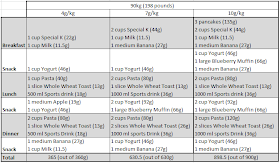Aside from tapering, carbo-loading is also one of those practices that a lot of runners think about but are never quite sure how to do properly. For something as straightforward as ingesting more carbohydrates prior to running a marathon, it's actually not that easy to get it right.
Also, some people swear by it and others...well not so much.
BUT if you are thinking about carbo-loading for your next race, here's a handy guide for you. I hope I was able to simplify it down to a manageable level so as to encourage rather than discourage you from trying it.
The overall premise is that the glycogen stored in our bodies is good enough for 90 to 120 minutes of activity; after that, you're on your own. Some reasearchers claim that replenishing your carbs while racing is not all that effective because it takes time for your body to process it to a usable state.
Mayo Clinic writes that carbo-loading of 4g/kg of body weight is sufficient but a write-up by Alex Hutchinson (Sweat Science, Runner's World) in the Globe and Mail citing a London study says that up to 10g/kg is closer to the correct amount but most people are only able to consume ~7g/kg. 10g/kg is too much food for most people!
Runners who successfully loaded prior to racing ran 13.4% faster and slowed down less than the non-loaders in the final 7 kilometers.
Another factoid to consider is that different types of carbs are absorbed in different ways. For example, the carbs in pasta are absorbed via different channels in the body as, say, a sports drink. In addition, the carbs in pasta are more complex and takes more time and calories to break down. Ingesting different types of carbs at the same time leads to more efficient loading than eating or drinking more of just one type of carbs.
Lastly, there's a debate on what's more effective: fueling days before the race or on the day before? Some folks advice slowly stepping up your consumption 2-3 days before the race and then eating a normal meal the day before to prevent GI distress while others say load up on the day before.
Don't be worried if you gain a few pounds while loading...this is because 1 g of carbs absorbs 2-3 g of water. You'll lose this water weight quickly enough as you're running your race.
So how much is enough?
Please note that I am not a nutritionist and the meals listed above are not recommendations but are simply illustrations of how much carbs are needed to reach the levels indicated. It's a lot of food!
As you can see, eating 10g/kg of bodyweight is not easy, unrealistic even for most people. Alex Hutchinson writes that one way that might help is to top up your carbs on the day of the race. This is accomplished by waking up a few hours before the race and consuming a sports drink to restore the glycogen that was used up while asleep (needed to maintain normal brain and body function).
The experiment continues and I will attempt to load up for 2 days and then eat normally on the day before the race. Let's hope it's enough to take me past the finish line without hitting the wall again (oh how I hate that wall).




No comments:
Post a Comment